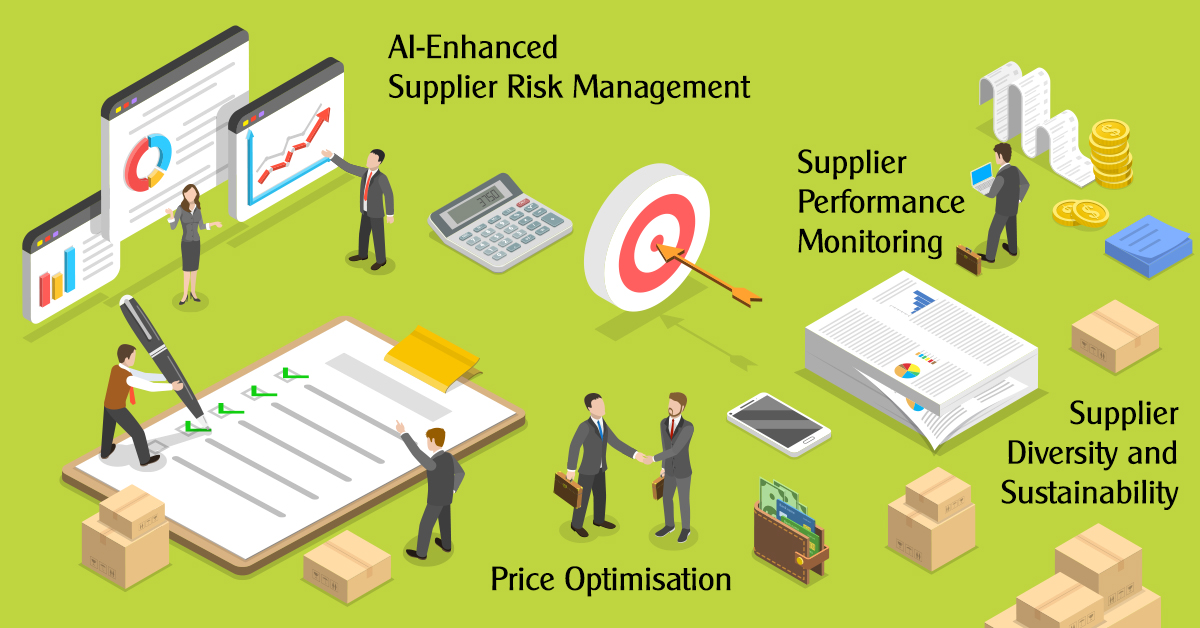If procurement is about buying things (and it is), then it follows that supplier relationship management (SRM) is the lifeblood of this function. The problem is that supply chains have swelled to unwieldy levels and data is flying in at astronomical rates, making SRM more complex and difficult than ever before.
There is, however, a silver lining in the form of cutting-edge technologies such as AI and automation. These innovations empower businesses to optimise supplier management processes, proactively address risks and curtail operational costs, offering a beacon of efficiency and competitiveness amid the ever-growing complexities.
In this piece, we’ll address the core issues of AI in supplier relationship management: What does it look like? How does it make life easier? What are some real-world use cases that make investment worthwhile?
What is Supplier Relationship Management?
Supplier Relationship Management (SRM) is the backbone of an effective procurement strategy It begins with the procurement team taking a strategic approach to supplier relationships. Key players in the SRM team include procurement operations managers, negotiators and consultants. Together, they create a procurement strategy that defines supplier selection criteria, assesses risks and outlines the process for choosing suppliers across different procurement categories.
Once the strategic approach is clear, the next step is to establish policies and procedures that align with the SRM strategy. Before finalising these, the SRM team must understand the organisation’s objectives and develop a supplier relationship management plan that supports these goals. Strategic procurement involves crafting formal SRM strategies, supplier selection, contract negotiation and collaborating with the internal SRM team to drive performance improvements, whether it’s cost reduction or inventory optimisation.
Enhancing Supplier Selection with Machine Learning
Supplier selection is a pivotal aspect of SRM as it directly impacts the effectiveness of procurement. AI, particularly machine learning, is emerging as a game-changer in this regard.
Machine learning models can significantly streamline the supplier selection process. For instance, an automatic pricing engine powered by machine learning algorithms can play a vital role. These algorithms have the capacity to sift through diverse data sources, providing valuable insights into pricing trends, historical purchase data, and even competitive pricing strategies.
By leveraging these insights, AI-driven solutions can recommend optimal prices for new products, detect any price changes made by competitors, and help organizations make informed decisions about supplier selection. This empowers procurement professionals to source products at the best prices with reduced risk.
Efficiency Gains and Supplier Performance Optimisation
AI and machine learning can assist procurement professionals in becoming more efficient and effective in managing supplier relationships. These technologies can evaluate supplier performance based on real-time data and historical metrics.
By determining which suppliers consistently meet expectations and which ones may require improvement or replacement, AI-driven SRM solutions enable organisations to maintain a top-performing supplier pool. This not only improves the quality of products and services but also minimizes disruptions in the supply chain.
In essence, AI and machine learning serve as invaluable tools within SRM, driving efficient supplier selection and ensuring that supplier relationships align with the organization’s strategic goals, all while optimizing costs and mitigating risks.
4 Use Cases for AI in Supplier Relationship Management
1. AI-Enhanced Supplier Risk Management:
AI-driven supplier risk management is a proactive shield against unforeseen disruptions. By training machine learning models on historical data, including past procurement incidents like fraud and theft involving external suppliers, organisations can develop a procurement risk score. This score is based on attributes similar to past incident data, enabling early identification of high-risk supplier partners. Techniques like decision trees and random forests are used to build these risk scores.
The result is a robust risk assessment system that empowers procurement professionals to take pre-emptive action, fortifying supplier relationships and safeguarding against future incidents.
2. Supplier Performance Monitoring
This is a critical pillar of effective SRM, and AI-driven solutions are revolutionising this aspect. Powered by machine learning, these systems continuously collect and analyse real-time data from diverse sources. They provide a comprehensive view of supplier performance, tracking key metrics that align with an organisation’s goals (on-time delivery performance, quality and defect rate, cost savings and cost efficiency, etc…).
When deviations from predefined benchmarks occur, these AI programs trigger immediate alerts and notifications, enabling procurement professionals to take swift, data-backed actions. This real-time approach ensures that supplier relationships remain aligned with strategic objectives, enhancing the reliability and efficiency of the supply chain.
3. Price Optimisation
What sets AI-powered pricing engines apart is their ability to go beyond simple cost analysis. They take into account dynamic market conditions, seasonal fluctuations and even consumer behaviour patterns. This multifaceted approach enables them to recommend pricing strategies that aren’t just competitive but also agile.
By offering insights into optimal pricing structures, these AI-driven engines empower organisations to make strategic procurement decisions. They ensure that goods and services are procured at the best prices, enhancing cost-effectiveness and bolstering competitiveness in the marketplace.
4. Supplier Diversity and Sustainability
In today’s business landscape, Supplier Relationship Management goes beyond traditional considerations to encompass supplier diversity and sustainability. AI plays a pivotal role in advancing these vital aspects of procurement.
AI helps organisations categorise suppliers based on factors like ownership and certifications, promoting supplier diversity, including minority-owned, women-owned or Indigenous-owned enterprises.
AI also assesses supplier contributions to environmental, social and governance (ESG) goals, evaluating factors such as carbon footprint and ethical labour practices. This data-driven approach enables organisations to make informed decisions that sit alongside their sustainability objectives.
AI can also aid in risk mitigation, identifying potential disruptions tied to supplier dependencies. This proactive approach ensures business continuity while supporting ethical and environmentally responsible procurement practices.
Start incorporating AI into your SRM
Supplier sourcing, a formidable challenge, often relies on the subjective judgments of procurement experts. However, machine learning promises a seismic shift. Through data-driven predictive analytics, it discerns potential best-in-class partners based on an intricate array of key metrics.
If you’re intrigued by the prospects of refining your supplier relationships or yearn for deeper insights into the machine learning marvels of procurement, reach out to us and we can help you begin the next exciting, Ai-powered chapter of your SRM journey.








